Management Skills Report: Theories, Communication, and Roles Analysis
VerifiedAdded on 2020/07/23
|7
|1956
|238
Report
AI Summary
This report provides a comprehensive analysis of essential management skills, emphasizing their significance in organizational success. It delves into the importance of effective management skills, exploring how they contribute to planning, organizing, directing, and controlling various functions within an organization. The report examines the impact of different communication methods, such as verbal and written communication, within a managerial context, and highlights their roles in sharing information and facilitating decision-making. Furthermore, it investigates the role and influence of management in shaping organizational culture, setting objectives, and motivating employees. The report also underscores the importance of diversity within organizations, discussing how diversified teams can bring in new ideas and tools. Finally, it explores various management theories on motivation, decision-making, and problem-solving, including the Hierarchy of Needs and Theory X and Y, offering insights into how managers can motivate employees to enhance performance. This analysis aims to provide a holistic understanding of management principles and practices.
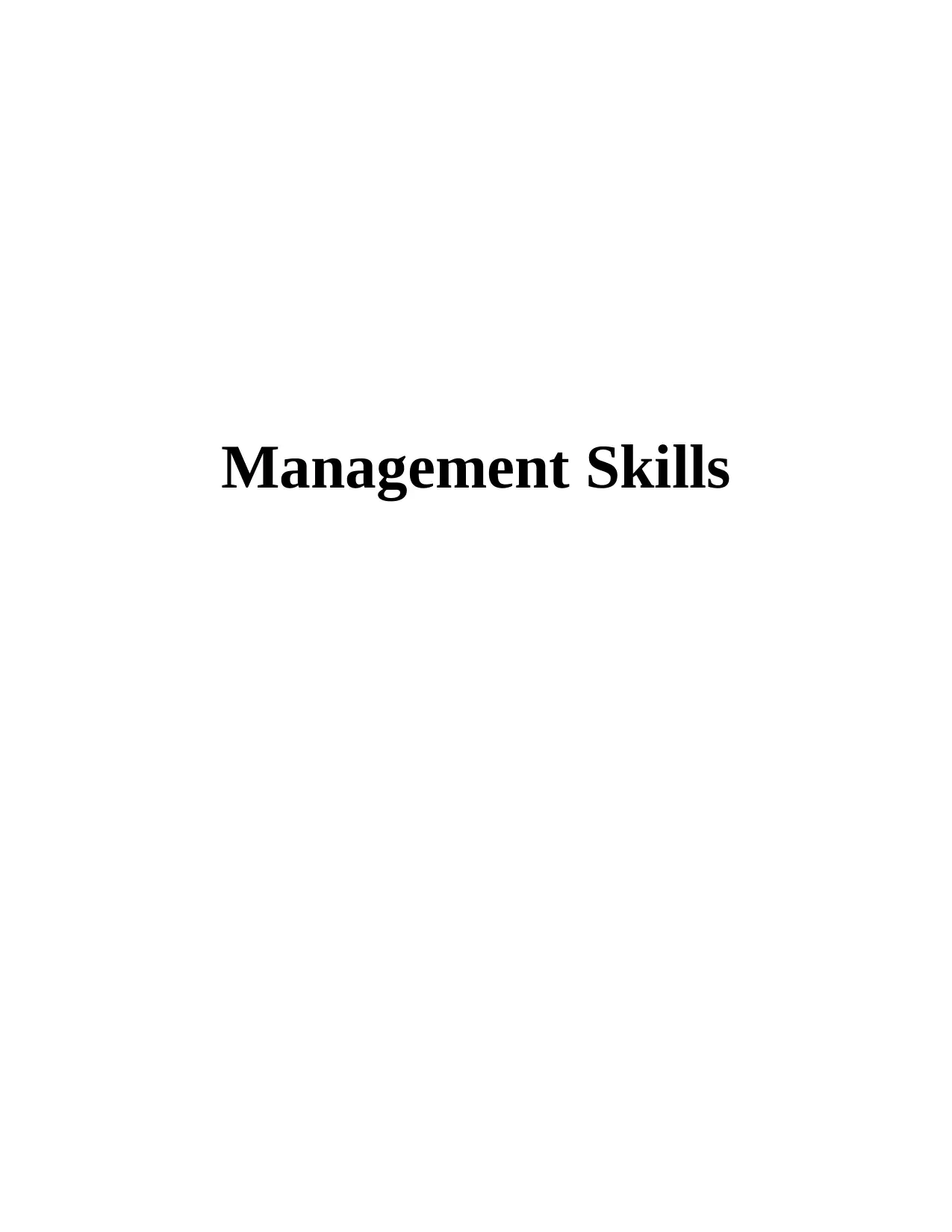
Management Skills
Paraphrase This Document
Need a fresh take? Get an instant paraphrase of this document with our AI Paraphraser
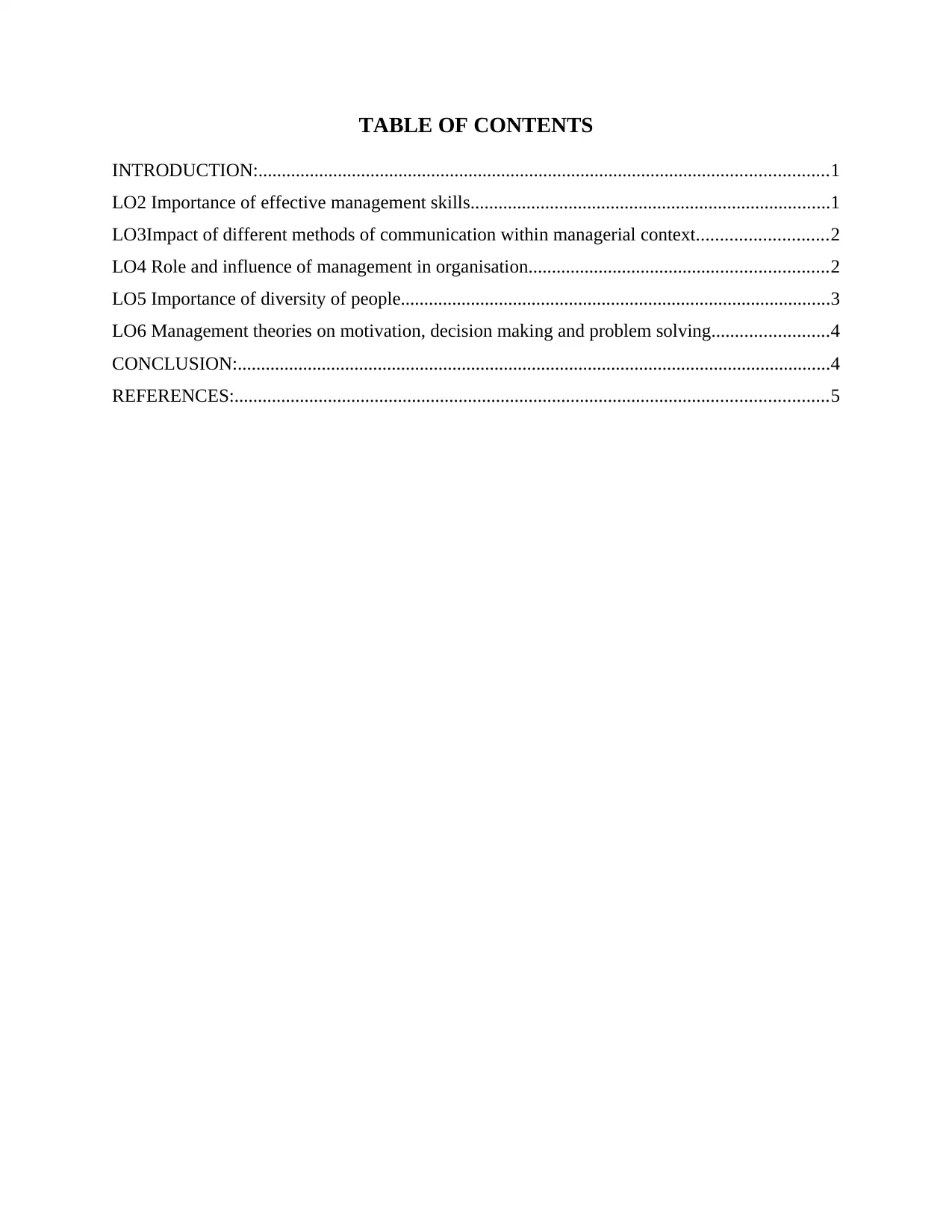
TABLE OF CONTENTS
INTRODUCTION:..........................................................................................................................1
LO2 Importance of effective management skills.............................................................................1
LO3Impact of different methods of communication within managerial context............................2
LO4 Role and influence of management in organisation................................................................2
LO5 Importance of diversity of people............................................................................................3
LO6 Management theories on motivation, decision making and problem solving.........................4
CONCLUSION:...............................................................................................................................4
REFERENCES:...............................................................................................................................5
INTRODUCTION:..........................................................................................................................1
LO2 Importance of effective management skills.............................................................................1
LO3Impact of different methods of communication within managerial context............................2
LO4 Role and influence of management in organisation................................................................2
LO5 Importance of diversity of people............................................................................................3
LO6 Management theories on motivation, decision making and problem solving.........................4
CONCLUSION:...............................................................................................................................4
REFERENCES:...............................................................................................................................5
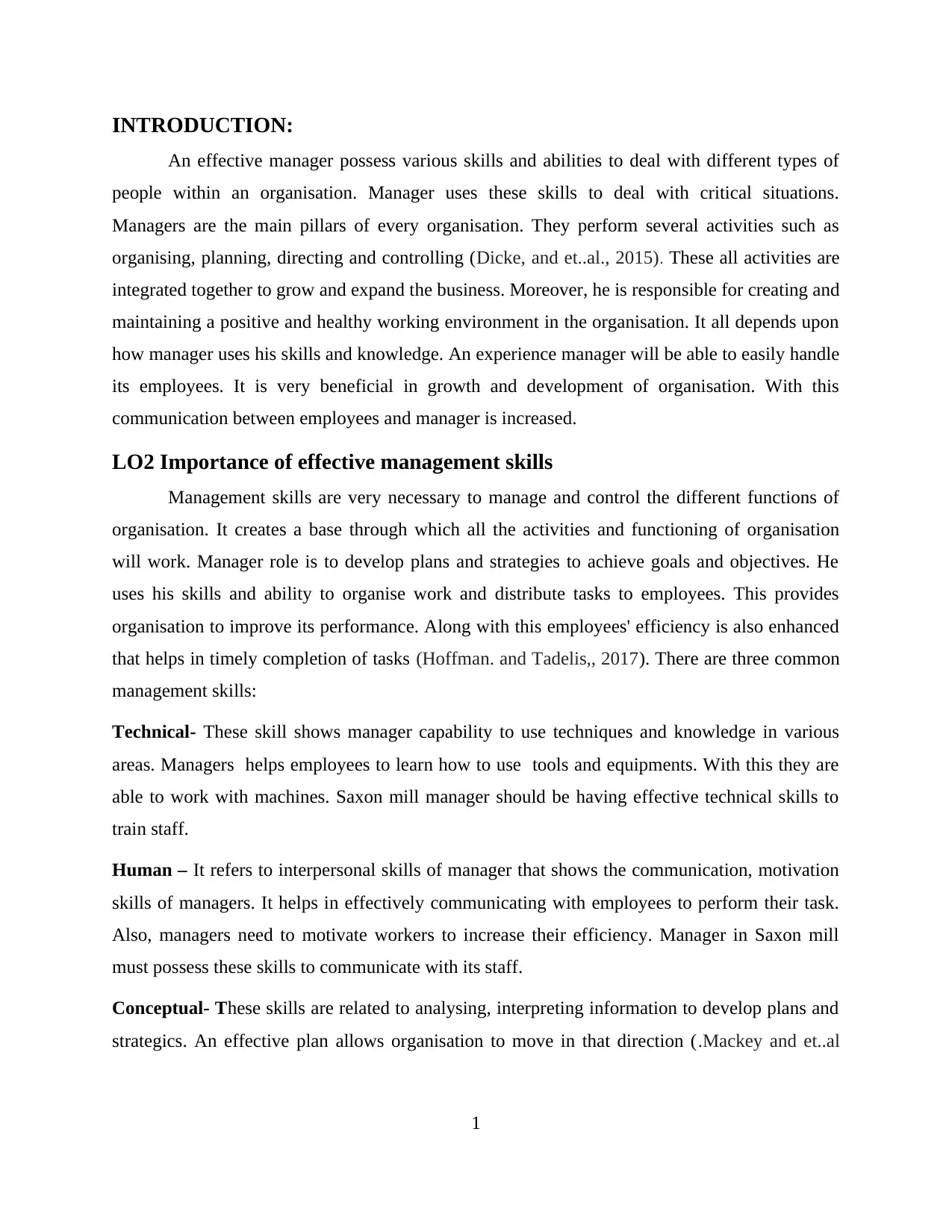
INTRODUCTION:
An effective manager possess various skills and abilities to deal with different types of
people within an organisation. Manager uses these skills to deal with critical situations.
Managers are the main pillars of every organisation. They perform several activities such as
organising, planning, directing and controlling (Dicke, and et..al., 2015). These all activities are
integrated together to grow and expand the business. Moreover, he is responsible for creating and
maintaining a positive and healthy working environment in the organisation. It all depends upon
how manager uses his skills and knowledge. An experience manager will be able to easily handle
its employees. It is very beneficial in growth and development of organisation. With this
communication between employees and manager is increased.
LO2 Importance of effective management skills
Management skills are very necessary to manage and control the different functions of
organisation. It creates a base through which all the activities and functioning of organisation
will work. Manager role is to develop plans and strategies to achieve goals and objectives. He
uses his skills and ability to organise work and distribute tasks to employees. This provides
organisation to improve its performance. Along with this employees' efficiency is also enhanced
that helps in timely completion of tasks (Hoffman. and Tadelis,, 2017). There are three common
management skills:
Technical- These skill shows manager capability to use techniques and knowledge in various
areas. Managers helps employees to learn how to use tools and equipments. With this they are
able to work with machines. Saxon mill manager should be having effective technical skills to
train staff.
Human – It refers to interpersonal skills of manager that shows the communication, motivation
skills of managers. It helps in effectively communicating with employees to perform their task.
Also, managers need to motivate workers to increase their efficiency. Manager in Saxon mill
must possess these skills to communicate with its staff.
Conceptual- These skills are related to analysing, interpreting information to develop plans and
strategics. An effective plan allows organisation to move in that direction (.Mackey and et..al
1
An effective manager possess various skills and abilities to deal with different types of
people within an organisation. Manager uses these skills to deal with critical situations.
Managers are the main pillars of every organisation. They perform several activities such as
organising, planning, directing and controlling (Dicke, and et..al., 2015). These all activities are
integrated together to grow and expand the business. Moreover, he is responsible for creating and
maintaining a positive and healthy working environment in the organisation. It all depends upon
how manager uses his skills and knowledge. An experience manager will be able to easily handle
its employees. It is very beneficial in growth and development of organisation. With this
communication between employees and manager is increased.
LO2 Importance of effective management skills
Management skills are very necessary to manage and control the different functions of
organisation. It creates a base through which all the activities and functioning of organisation
will work. Manager role is to develop plans and strategies to achieve goals and objectives. He
uses his skills and ability to organise work and distribute tasks to employees. This provides
organisation to improve its performance. Along with this employees' efficiency is also enhanced
that helps in timely completion of tasks (Hoffman. and Tadelis,, 2017). There are three common
management skills:
Technical- These skill shows manager capability to use techniques and knowledge in various
areas. Managers helps employees to learn how to use tools and equipments. With this they are
able to work with machines. Saxon mill manager should be having effective technical skills to
train staff.
Human – It refers to interpersonal skills of manager that shows the communication, motivation
skills of managers. It helps in effectively communicating with employees to perform their task.
Also, managers need to motivate workers to increase their efficiency. Manager in Saxon mill
must possess these skills to communicate with its staff.
Conceptual- These skills are related to analysing, interpreting information to develop plans and
strategics. An effective plan allows organisation to move in that direction (.Mackey and et..al
1
⊘ This is a preview!⊘
Do you want full access?
Subscribe today to unlock all pages.

Trusted by 1+ million students worldwide
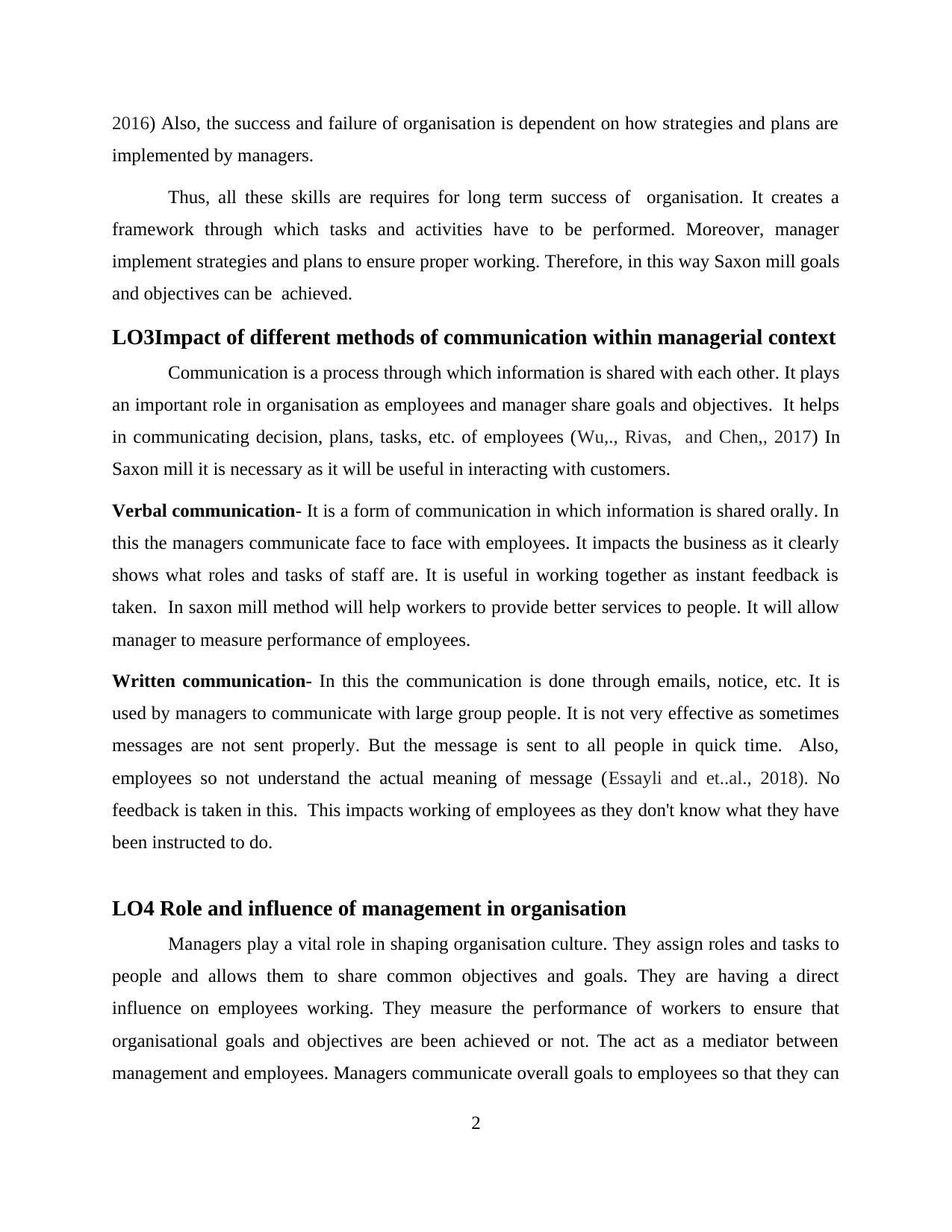
2016) Also, the success and failure of organisation is dependent on how strategies and plans are
implemented by managers.
Thus, all these skills are requires for long term success of organisation. It creates a
framework through which tasks and activities have to be performed. Moreover, manager
implement strategies and plans to ensure proper working. Therefore, in this way Saxon mill goals
and objectives can be achieved.
LO3Impact of different methods of communication within managerial context
Communication is a process through which information is shared with each other. It plays
an important role in organisation as employees and manager share goals and objectives. It helps
in communicating decision, plans, tasks, etc. of employees (Wu,., Rivas, and Chen,, 2017) In
Saxon mill it is necessary as it will be useful in interacting with customers.
Verbal communication- It is a form of communication in which information is shared orally. In
this the managers communicate face to face with employees. It impacts the business as it clearly
shows what roles and tasks of staff are. It is useful in working together as instant feedback is
taken. In saxon mill method will help workers to provide better services to people. It will allow
manager to measure performance of employees.
Written communication- In this the communication is done through emails, notice, etc. It is
used by managers to communicate with large group people. It is not very effective as sometimes
messages are not sent properly. But the message is sent to all people in quick time. Also,
employees so not understand the actual meaning of message (Essayli and et..al., 2018). No
feedback is taken in this. This impacts working of employees as they don't know what they have
been instructed to do.
LO4 Role and influence of management in organisation
Managers play a vital role in shaping organisation culture. They assign roles and tasks to
people and allows them to share common objectives and goals. They are having a direct
influence on employees working. They measure the performance of workers to ensure that
organisational goals and objectives are been achieved or not. The act as a mediator between
management and employees. Managers communicate overall goals to employees so that they can
2
implemented by managers.
Thus, all these skills are requires for long term success of organisation. It creates a
framework through which tasks and activities have to be performed. Moreover, manager
implement strategies and plans to ensure proper working. Therefore, in this way Saxon mill goals
and objectives can be achieved.
LO3Impact of different methods of communication within managerial context
Communication is a process through which information is shared with each other. It plays
an important role in organisation as employees and manager share goals and objectives. It helps
in communicating decision, plans, tasks, etc. of employees (Wu,., Rivas, and Chen,, 2017) In
Saxon mill it is necessary as it will be useful in interacting with customers.
Verbal communication- It is a form of communication in which information is shared orally. In
this the managers communicate face to face with employees. It impacts the business as it clearly
shows what roles and tasks of staff are. It is useful in working together as instant feedback is
taken. In saxon mill method will help workers to provide better services to people. It will allow
manager to measure performance of employees.
Written communication- In this the communication is done through emails, notice, etc. It is
used by managers to communicate with large group people. It is not very effective as sometimes
messages are not sent properly. But the message is sent to all people in quick time. Also,
employees so not understand the actual meaning of message (Essayli and et..al., 2018). No
feedback is taken in this. This impacts working of employees as they don't know what they have
been instructed to do.
LO4 Role and influence of management in organisation
Managers play a vital role in shaping organisation culture. They assign roles and tasks to
people and allows them to share common objectives and goals. They are having a direct
influence on employees working. They measure the performance of workers to ensure that
organisational goals and objectives are been achieved or not. The act as a mediator between
management and employees. Managers communicate overall goals to employees so that they can
2
Paraphrase This Document
Need a fresh take? Get an instant paraphrase of this document with our AI Paraphraser
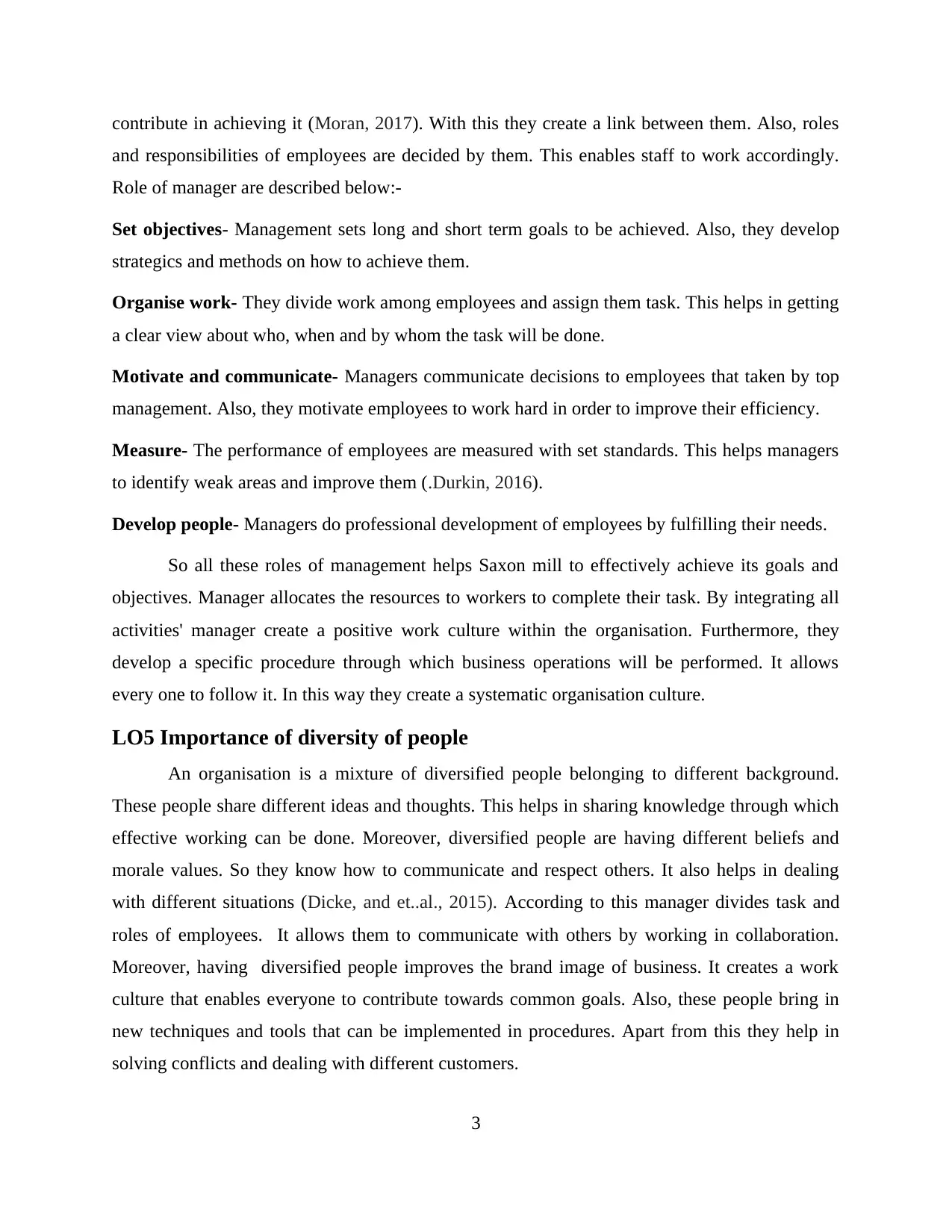
contribute in achieving it (Moran, 2017). With this they create a link between them. Also, roles
and responsibilities of employees are decided by them. This enables staff to work accordingly.
Role of manager are described below:-
Set objectives- Management sets long and short term goals to be achieved. Also, they develop
strategics and methods on how to achieve them.
Organise work- They divide work among employees and assign them task. This helps in getting
a clear view about who, when and by whom the task will be done.
Motivate and communicate- Managers communicate decisions to employees that taken by top
management. Also, they motivate employees to work hard in order to improve their efficiency.
Measure- The performance of employees are measured with set standards. This helps managers
to identify weak areas and improve them (.Durkin, 2016).
Develop people- Managers do professional development of employees by fulfilling their needs.
So all these roles of management helps Saxon mill to effectively achieve its goals and
objectives. Manager allocates the resources to workers to complete their task. By integrating all
activities' manager create a positive work culture within the organisation. Furthermore, they
develop a specific procedure through which business operations will be performed. It allows
every one to follow it. In this way they create a systematic organisation culture.
LO5 Importance of diversity of people
An organisation is a mixture of diversified people belonging to different background.
These people share different ideas and thoughts. This helps in sharing knowledge through which
effective working can be done. Moreover, diversified people are having different beliefs and
morale values. So they know how to communicate and respect others. It also helps in dealing
with different situations (Dicke, and et..al., 2015). According to this manager divides task and
roles of employees. It allows them to communicate with others by working in collaboration.
Moreover, having diversified people improves the brand image of business. It creates a work
culture that enables everyone to contribute towards common goals. Also, these people bring in
new techniques and tools that can be implemented in procedures. Apart from this they help in
solving conflicts and dealing with different customers.
3
and responsibilities of employees are decided by them. This enables staff to work accordingly.
Role of manager are described below:-
Set objectives- Management sets long and short term goals to be achieved. Also, they develop
strategics and methods on how to achieve them.
Organise work- They divide work among employees and assign them task. This helps in getting
a clear view about who, when and by whom the task will be done.
Motivate and communicate- Managers communicate decisions to employees that taken by top
management. Also, they motivate employees to work hard in order to improve their efficiency.
Measure- The performance of employees are measured with set standards. This helps managers
to identify weak areas and improve them (.Durkin, 2016).
Develop people- Managers do professional development of employees by fulfilling their needs.
So all these roles of management helps Saxon mill to effectively achieve its goals and
objectives. Manager allocates the resources to workers to complete their task. By integrating all
activities' manager create a positive work culture within the organisation. Furthermore, they
develop a specific procedure through which business operations will be performed. It allows
every one to follow it. In this way they create a systematic organisation culture.
LO5 Importance of diversity of people
An organisation is a mixture of diversified people belonging to different background.
These people share different ideas and thoughts. This helps in sharing knowledge through which
effective working can be done. Moreover, diversified people are having different beliefs and
morale values. So they know how to communicate and respect others. It also helps in dealing
with different situations (Dicke, and et..al., 2015). According to this manager divides task and
roles of employees. It allows them to communicate with others by working in collaboration.
Moreover, having diversified people improves the brand image of business. It creates a work
culture that enables everyone to contribute towards common goals. Also, these people bring in
new techniques and tools that can be implemented in procedures. Apart from this they help in
solving conflicts and dealing with different customers.
3
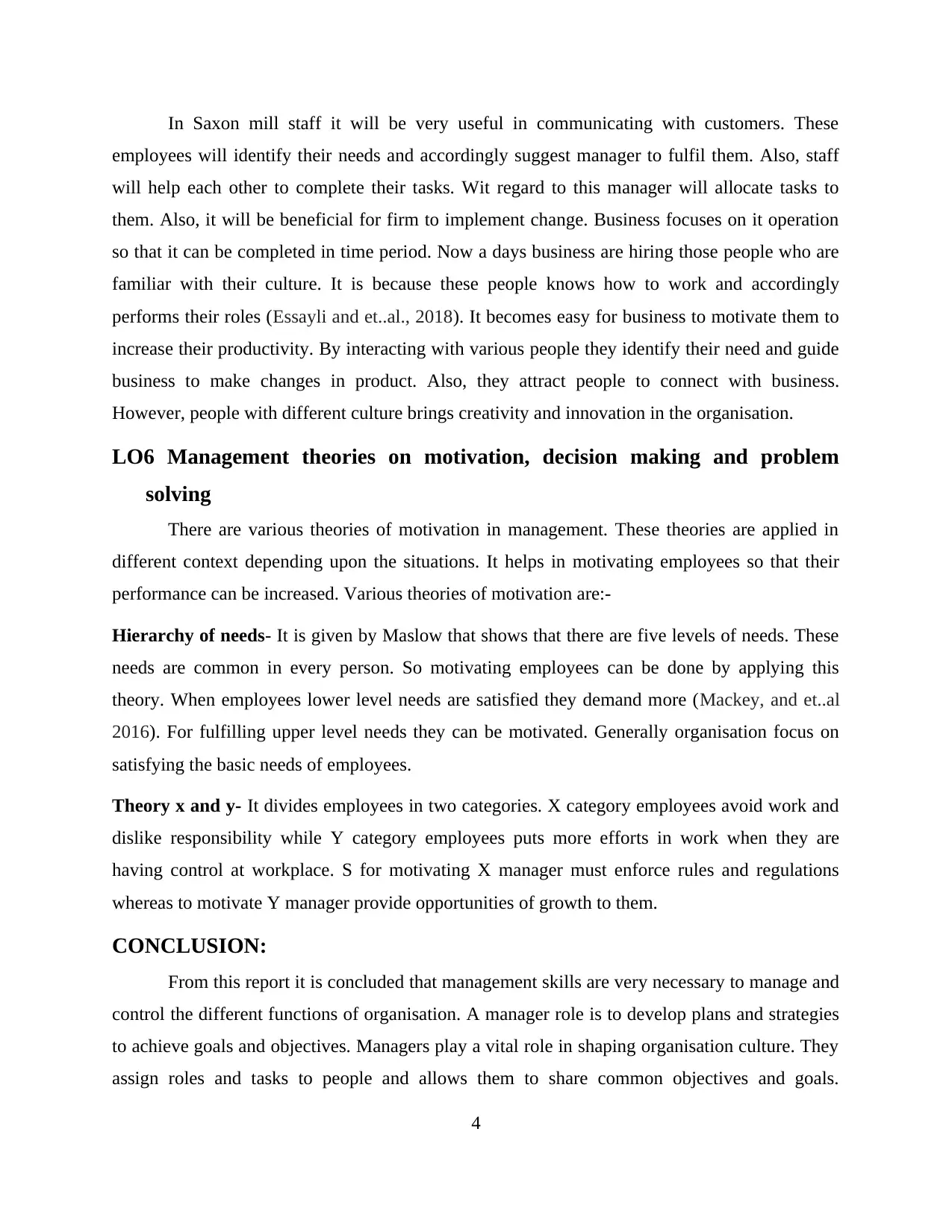
In Saxon mill staff it will be very useful in communicating with customers. These
employees will identify their needs and accordingly suggest manager to fulfil them. Also, staff
will help each other to complete their tasks. Wit regard to this manager will allocate tasks to
them. Also, it will be beneficial for firm to implement change. Business focuses on it operation
so that it can be completed in time period. Now a days business are hiring those people who are
familiar with their culture. It is because these people knows how to work and accordingly
performs their roles (Essayli and et..al., 2018). It becomes easy for business to motivate them to
increase their productivity. By interacting with various people they identify their need and guide
business to make changes in product. Also, they attract people to connect with business.
However, people with different culture brings creativity and innovation in the organisation.
LO6 Management theories on motivation, decision making and problem
solving
There are various theories of motivation in management. These theories are applied in
different context depending upon the situations. It helps in motivating employees so that their
performance can be increased. Various theories of motivation are:-
Hierarchy of needs- It is given by Maslow that shows that there are five levels of needs. These
needs are common in every person. So motivating employees can be done by applying this
theory. When employees lower level needs are satisfied they demand more (Mackey, and et..al
2016). For fulfilling upper level needs they can be motivated. Generally organisation focus on
satisfying the basic needs of employees.
Theory x and y- It divides employees in two categories. X category employees avoid work and
dislike responsibility while Y category employees puts more efforts in work when they are
having control at workplace. S for motivating X manager must enforce rules and regulations
whereas to motivate Y manager provide opportunities of growth to them.
CONCLUSION:
From this report it is concluded that management skills are very necessary to manage and
control the different functions of organisation. A manager role is to develop plans and strategies
to achieve goals and objectives. Managers play a vital role in shaping organisation culture. They
assign roles and tasks to people and allows them to share common objectives and goals.
4
employees will identify their needs and accordingly suggest manager to fulfil them. Also, staff
will help each other to complete their tasks. Wit regard to this manager will allocate tasks to
them. Also, it will be beneficial for firm to implement change. Business focuses on it operation
so that it can be completed in time period. Now a days business are hiring those people who are
familiar with their culture. It is because these people knows how to work and accordingly
performs their roles (Essayli and et..al., 2018). It becomes easy for business to motivate them to
increase their productivity. By interacting with various people they identify their need and guide
business to make changes in product. Also, they attract people to connect with business.
However, people with different culture brings creativity and innovation in the organisation.
LO6 Management theories on motivation, decision making and problem
solving
There are various theories of motivation in management. These theories are applied in
different context depending upon the situations. It helps in motivating employees so that their
performance can be increased. Various theories of motivation are:-
Hierarchy of needs- It is given by Maslow that shows that there are five levels of needs. These
needs are common in every person. So motivating employees can be done by applying this
theory. When employees lower level needs are satisfied they demand more (Mackey, and et..al
2016). For fulfilling upper level needs they can be motivated. Generally organisation focus on
satisfying the basic needs of employees.
Theory x and y- It divides employees in two categories. X category employees avoid work and
dislike responsibility while Y category employees puts more efforts in work when they are
having control at workplace. S for motivating X manager must enforce rules and regulations
whereas to motivate Y manager provide opportunities of growth to them.
CONCLUSION:
From this report it is concluded that management skills are very necessary to manage and
control the different functions of organisation. A manager role is to develop plans and strategies
to achieve goals and objectives. Managers play a vital role in shaping organisation culture. They
assign roles and tasks to people and allows them to share common objectives and goals.
4
⊘ This is a preview!⊘
Do you want full access?
Subscribe today to unlock all pages.

Trusted by 1+ million students worldwide
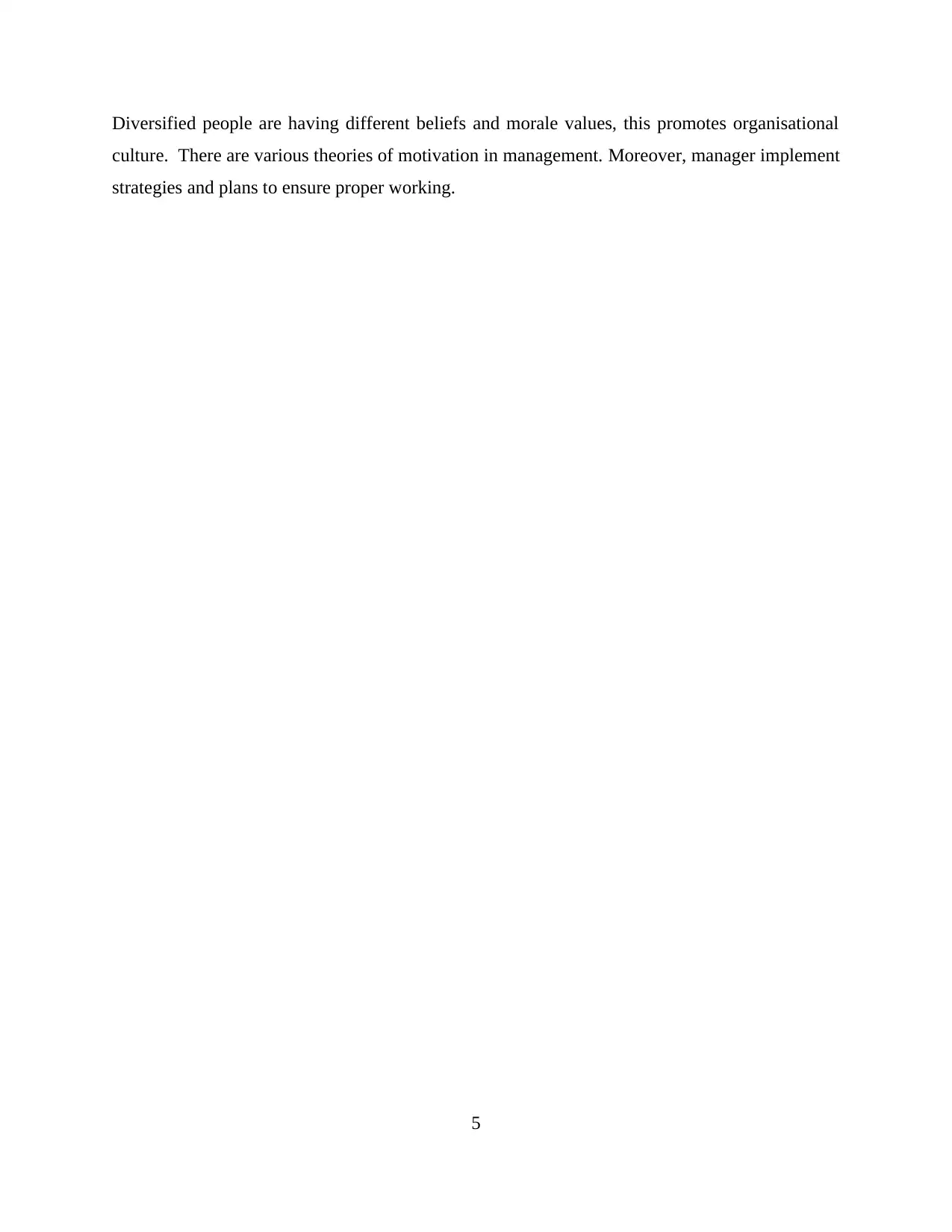
Diversified people are having different beliefs and morale values, this promotes organisational
culture. There are various theories of motivation in management. Moreover, manager implement
strategies and plans to ensure proper working.
5
culture. There are various theories of motivation in management. Moreover, manager implement
strategies and plans to ensure proper working.
5
1 out of 7
Related Documents
Your All-in-One AI-Powered Toolkit for Academic Success.
+13062052269
info@desklib.com
Available 24*7 on WhatsApp / Email
![[object Object]](/_next/static/media/star-bottom.7253800d.svg)
Unlock your academic potential
Copyright © 2020–2025 A2Z Services. All Rights Reserved. Developed and managed by ZUCOL.





